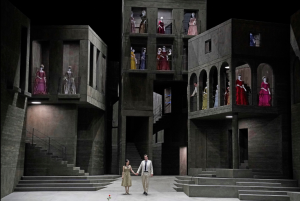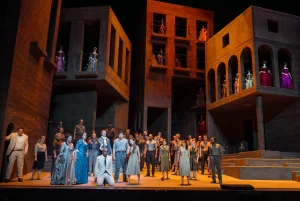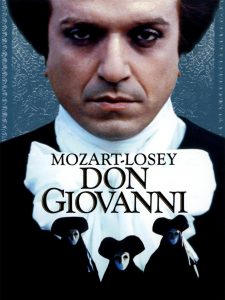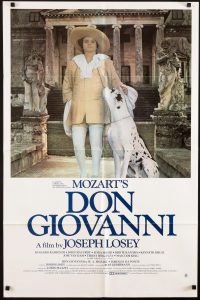Ivo van Hove’s Met “Don Giovanni” strives (rather unnecessarily) for relevance
by Pauline Park
“Don Giovanni” is considered by many to be the greatest opera ever written and while I do not think one can single out one opera for that distinction, Wolfgang Amadeus Mozart’s masterpiece would certainly be on any musicologist’s top ten list; but for a work first staged in 1787, it is surprisingly and perhaps even startlingly relevant to today’s heated debates about class and gender and even current political scandals and controversies in New York and beyond; and so while Ivo van Hove’s production now being revived at the Metropolitan Opera is an impressive one, the director may be accused of trying too hard to make this 18th century music drama relevant when it requires no special pleading.
One need only sketch out the plot of the opera to make its relevance to contemporary concerns clear: Don Juan (a.k.a., ‘Don Giovanni’) is a wealthy aristocrat who seduces and discards thousands of women — “Ma in Ispagna, son già mille tre” (but in Spain, there are already 1003) — including the vulnerable Donna Elvira (Leporello tells Elvira); the sexual predator climbs into Donna Anna’s bed only to be pursued by her father; Giovanni turns on his pursuer and then kills the Commendatore — with a gun rather than a sword in this production. Later, Giovanni tries to part the peasant groom and bride Masetto and Zerlina as the seduction (“Là ci darem la mano”) turns into a scene of attempted rape. Giovanni’s crimes eventually become clear to all, including Anna’s fiancé, Don Ottavio; and in the end, cosmic powers at work ensure a kind of divine justice: “Questo è il fin di chi fa mal e de’ perfidi la morte alla vita è sempre ugual” (Such is the end of one who does evil and his death is like his life) sing Giovanni’s antagonists as they bring the curtain down with the concluding sextet — one of those moments of music touched by divinity for which there is no explanation other than sheer genius.
Shades of the Epstein files — not to mention the scandals engulfing the current president and a certain notoriously predatory former governor as well as a British prince of the blood royal — in a work written 238 years ago. I saw this production with friends new to “Don Giovanni” and they were struck by its themes of gender and class; it could well be called the opera of the #MeToo moment or even of the erstwhile #OccupyWallStreet movement; a production needs no modern dress or other modernization for intelligent and informed audience members to make such connections in their own minds.
Van Hove’s decision to costume the cast in modern dress neither added nor detracted anything from the basic drama, though putting Giovanni, Anna and Elvira in 18th century costume in the first act finale seemed intended to make some sort of point not obvious to this viewer; even odder, given the period costumes employed in the scene, those three ‘mascherati’ did not wear masks — compelling the ‘Met Titles’ (the subtitles on the back of the chair in front of the audience member) to omit reference to them as masked guests. The Brutalist architecture in the set in which all the action takes place until the finale was crudely effective but the only truly impressive staging was that of the dénouement — with demonic creatures projected against a backdrop that reminded me of those in “Le Jardin des Délices” (“The Garden of Earthly Delights” by Hieronymus Bosch). Oddly enough, Met Titles repeatedly translated ‘cavaliere’ as ‘gentleman’ even though there is a word for ‘gentleman’ in Italian (‘gentiluomo’) — softening the class conflict inherent in Lorenzo da Ponte’s libretto — when the more accurate translation would be ‘aristocrat.’
Yannick Nézet-Séguin conducted efficiently in a production that is truly a rara avis — a cast of “Don Giovanni” without a single weak lead: Kathleen O’Mara (Donna Anna) and Janai Brugger (Donna Elvira) had medium-sized voices that only seemed small in comparison with the large voices of Hera Hyesang Park (Zerlina), Ryan Speedo Green (Don Giovanni), Adam Plachetka (Leporello) and Ben Bliss (Don Ottavio). Green made a suave and commanding Giovanni and Plachetka made the most of the comic possibilities in a role that takes on increasing importance and dramatic weight as the drama proceeds. O’Mara delivered emotional weight in her ‘vendetta’ aria “Or sai chi l’onore” and an elegant line in “Non mi dir,” Anna’s two arias only marred by a few strained high notes when her voice became somewhat shrill and unfocused. Brugger demonstrated deft comic timing as Elvira and skillfully negotiated the difficult passages in “Mi tradì.” William Guanbo Su carried off Masetto’s arias with athletic aplomb as a very butch country bumpkin. Adam Palka was a commanding Commendatore, though the director’s inexplicable decision to have him walk around the stage instead of appearing as the head of a statue in “O, statua gentillissima” diminished the impact of the chilling invitation to Don Giovanni to dine with him. To my ear, the two standouts vocally were Park and Bliss: the Korean soprano had an unusually powerful voice for someone cast in a soubrette role and articulated Zerlina’s two arias with the strength of a spinto voice and the clarity and adroit skill of a soprano d’agilità. And the one tenor in the cast was the best Ottavio I have ever heard; the da capo ornamentations of his “Dalla sua pace” and his “Il mio tesoro” were superbly elegant and sung with baritonal strength and depth without any apparent strain in reaching the high notes; Bliss also played Ottavio as a passionate partner to his beloved Anna, avoiding the usual wimpy characterization of her perennially frustrated amato bene.
The renowned German theologian Karl Barth famously said, “It may be that when the angels go about their task praising God, they play only Bach; I am sure, however, that when they are together en famille they play Mozart.” Mozart’s “Don Giovanni” ends with a startling vision of a vicious sexual predator being dragged down into hell with some of the most heavenly music ever written and one could hardly find a better starting point for an exploration of Mozartean opera than this superbly sung and wonderfully engaging revival of Ivo van Hove’s Met production of this immortal masterpiece.
Pauline Park is an activist and writer based in Queens and has written widely on politics and the arts.
…a musicological note on “Don Giovanni”:
Mozart established the very concept of an operatic repertory with “Le Nozze di Figaro” (The Marriage of Figaro) in 1986 — the first opera never to leave the repertoire; he followed this with the second of his four operatic masterpieces, calling “Don Giovanni” a ‘dramma giacoso’; today, we might call it a ‘dramedy’; the genius was his use of the language of opera buffa (comic opera) to create a large-scale architectonic and for the first time in opera, dramatic movement through ensembles; “Figaro” may thus be called the first true music drama in history and “Don Giovanni” the second, skillfully blending elements of the by then old-fashioned opera seria (‘serious’ or tragic opera). Donna Anna and Don Ottavio are characters straight out of opera seria, while Zerlina, Masetto and Leporello are stock opera buffa characters. Donna Elvira is essentially an opera buffa character as demonstrated by her association with the ‘buffo’ keys of E-flat and B-flat; Don Giovanni has three arias but it is only through the ensembles and his interactions with the other characters that he reveals his true character. As Charles Rosen writes in his classic and never surpassed analysis of the music of Franz Joseph Haydn, Wolfgang Amadeus Mozart and Ludwig van Beethoven, “The Classical Style,” Mozart tonal key relationships and the sonata allegro form that Haydn created in order to forge this extraordinary and revolutionary language of music drama; how ironic that Haydn himself never used it in his own operas.
“Così Fan Tutte” is the third of the operas with libretti by Lorenzo da Ponte and is every bit the equal of “Figaro” and “Don Giovanni” even if there is nothing as overtly political in the last of the da Ponte operas which significantly is the only one that is entirely original to da Ponte. It would be Emanuel Schikaneder who would write the libretto to Mozart’s last opera and “Die Zauberflöte” would be both the culmination of his operatic career as well as a distinct break from the three great Italian operas. Others would follow who arguably equalled Mozart’s achievements in music drama but none has ever surpassed them.



